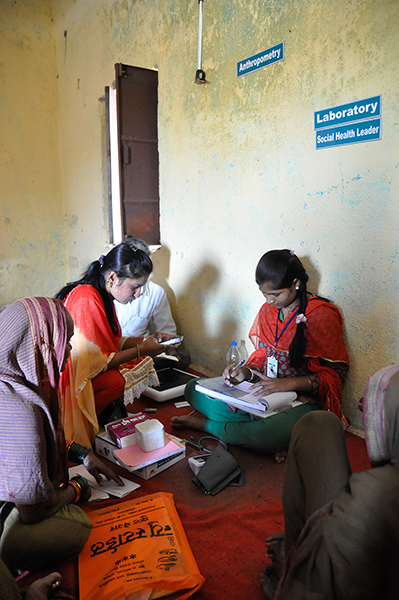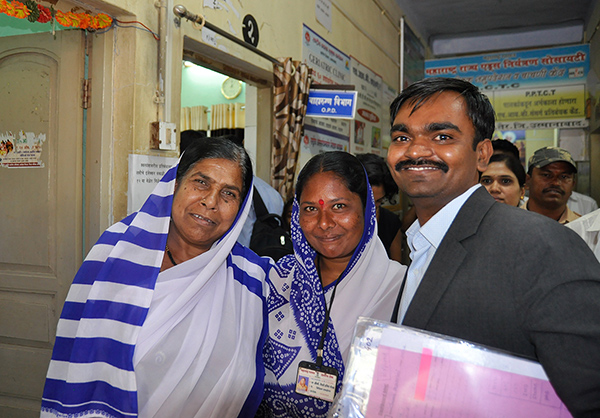Championing Hypertension Control in Rural India
This web page is archived for historical purposes and is no longer being updated.
Championing Hypertension Control in Rural India

Dr. Arun More is on a mission. As a doctor practicing in rural India, he knows firsthand what happens when people don’t have access to basic preventive services. One of his most poignant memories is of a pregnant mother and her unborn baby both dying because the mother had undiagnosed rheumatic heart disease – a condition that should have been treatable. She was never screened.
There are hundreds of similar stories of patients who are never diagnosed until it’s too late. “Everyone should be screened for hypertension at least once in their lifetime,” says Dr. More.
High blood pressure, or hypertension, has risen dramatically in many countries over the past few decades. In India, more than 29% of adults have high blood pressure 1, and cardiovascular disease is now the leading cause of death 2. Because hypertension does not have visible symptoms, it is known as the “silent killer.”
Bringing hope and health to remote places
What was previously thought of as a disease of urban, affluent populations is increasingly being seen in impoverished, rural areas like Maharashtra state, where Dr. More practices. Many villagers use traditional medicine and have never had their blood pressure measured.
According to a baseline study, three quarters of the villages in Maharashtra state have no public health facility and, even in villages with a public health facility, over 72% of villagers have never gotten their blood pressure checked. In nearly half of villagers with diagnosed high blood pressure, the condition is uncontrolled 3.
Seeing a clear need to improve hypertension screening in remote rural villages, in 2015 Dr. More created the Rural Health Progress Trust (RHPT) nonprofit. Through RHPT, Dr. More and his network of partners and Social Health Leaders are bringing international best practices in hypertension screening and treatment to remote areas where most residents have never heard of “blood pressure.”
An innovative program lights the way

As part of the new program, Social Health Leaders go house to house, completing health questionnaires and doing blood pressure screenings. If a patient has high blood pressure, they come back to take another reading and, if blood pressure is still high, an RHPT physician returns the following week with a “mobile hypertension clinic” to screen again and do lab tests.
Depending on the lab results, the RHPT physician will prescribe the appropriate treatment, refer the patient to their personal physician and follow-up directly with the physician to notify them of the diagnosis and care plan. Social Health Leaders continue to check patient’s blood pressure levels and make sure they are taking their medicine.
Overcoming the odds
Gaining the trust of community members is crucial to getting as many villagers as possible screened for hypertension. RHPT leverages existing community events to promote healthy practices, trains local teachers to teach health education and health literacy to students, and empowers villagers to be “expert patients” to help dispel rumors and misinformation about health screenings and treatment. To break down barriers to accessing medicine, Dr. More is networking with existing women-led microfinancing groups to purchase and deliver medicines monthly.
An international delegation recently visited India to learn about Dr. More’s groundbreaking work. During the visit, Kristy Joseph of CDC Division of Global Health Protection’s Global Noncommunicable Diseases Branch noted how dedicated everyone was to the project. “Though resources are limited, their ambition to see change in their community pushes them further,” says Kristy. “Portions of the road to the villages are unpaved and far from town, electricity isn’t consistent, and the next city is a bumpy, seven-hour drive away, but they have one goal in mind: to screen for high blood pressure. It was amazing to see how passionate they are.”
Breaking new ground
Right now, Dr. More is focused on turning the villages into a model for other communities in low- and middle-income countries to improve their hypertension outcomes. One very successful aspect of RHPT is how Dr. More has built strong relationships with stakeholders in academia, civil society, and local governments, including connections with larger urban areas in the region. This engagement gives RHPT a strong network to build or expand on in the future.
Dr. More is also leading the way by showing how local communities can adapt international best practices and recommendations to suit the local context. He has based his program on the Lancet Commission for Hypertension’s strategy report, as well as the Global Hearts Initiative. Future plans include IT solutions like mobile phone apps to help Social Health Leaders and physicians track patients. Starting from the ground up, Dr. More and his collaborators are showing what is possible when a passionate group of people with the right tools are determined to make a difference.
We would like to acknowledge Dr. Arun More, Ernst Rietzschel, Angelo Scuteri, Michael Olsen, Simone Dyhr Johansen, and Daniel Daugaard-Jense. CDC is a co-author of the Lancet Commission on Hypertension report and a partner, along with World Health Organization and others, in the Global Hearts Initiative.
For more information
- Rural Health Progress Trust
- Heeple India Excursion
- Lancet Commission for Hypertension report
- Global Hearts Initiative
1 https://www.ncbi.nlm.nih.gov/pmc/articles/PMC4011565/
2 https://www.ncbi.nlm.nih.gov/pubmed/27142605
3 Arun et al., Healthcare structure in rural India and its implications on diagnosis and management of hypertension.